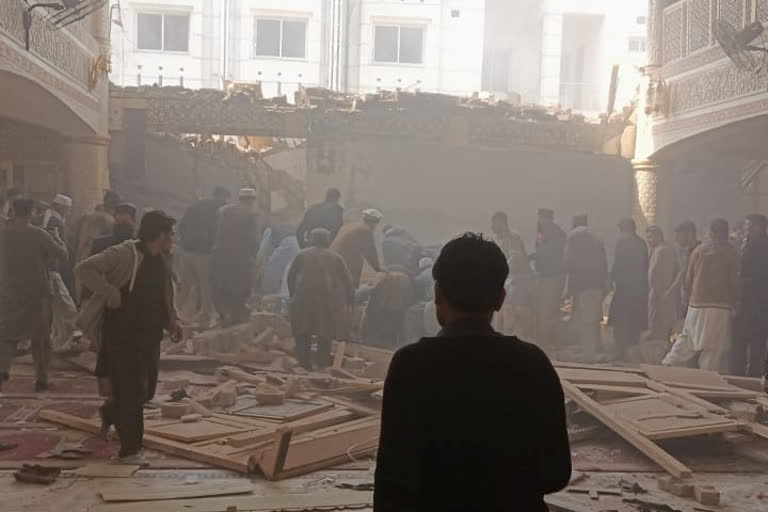Islamabad: At least 61 people were killed and over 150 others were injured after an alleged Tehreek-e-Taliban Pakistan (TTP) suicide bomber blew himself inside a mosque in Pakistan's Peshawar on Monday. The blast occurred in the mosque in the Police Lines area around 1.40 pm when the suicide bomber present in the front row during the Zuhr (afternoon) prayers blew himself up, security officials said.
Hospital officials said 61 people have died so far. There were mostly policemen and security officials among the dead and injured. A brother of the slain commander of the TTP Umar Khalid Khurasani claimed that the suicide blast was part of the revenge attack for his brother who was killed last August in Afghanistan, reported PTI.
The outlawed TTP, known as the Pakistani Taliban, has carried out a number of suicide attacks in the past, targeting security personnel. Prime Minister Shehbaz Sharif and Army chief General Asim Munir dashed to Peshawar to review the relief and rescue operation. The premier along with the army chief also visited the Lady Reading Hospital in Peshawar and inquired after the health of the injured. Interior Minister Rana Sanaullah and other officials were also present.
Information Minister Marriyum Aurangzeb tweeted that the premier summoned an emergency meeting. She said that all relevant institutions have been directed to attend the meeting which will look into the motives behind the terrorist attack. The preliminary probe report would be presented in the meeting.
Superintendent of Police (Investigation), Peshawar, Shazad Kaukab, whose office is close to the mosque, told the media that the blast occurred when he just entered the mosque to offer prayers. He said he luckily survived the attack. A police official said that a portion of the mosque collapsed and several people were believed to be under it.
"We are currently focused on the rescue operation. Our first priority is to safely retrieve the people buried under the debris," in-charge Rescue operation Bilal Faizi told the media. The headquarters of the Peshawar Police, Counter-Terrorism Department (CTD), Frontier Reserve Police (FRP), Elite Force and telecommunications department are also located near the blast site. The bomber entered the highly secured mosque inside police lines where four layers of security were in place.
Quoting Capital City Police Officer (CCPO) Peshawar Muhammad Ijaz Khan, Dawn newspaper said that a number of jawans are still stuck under the rubble and rescuers are trying to pull them out. Khan said between 300 to 400 police officials were present in the area at the time of the blast. "It is apparent that a security lapse occurred," he told the media.
Earlier, Prime Minister Sharif strongly condemned the attack, saying the attackers behind the incident "have nothing to do with Islam. Terrorists want to create fear by targeting those who perform the duty of defending Pakistan, he said and vowed that the sacrifices of the blast victims will not go in vain. The entire nation is standing united against the menace of terrorism."
Former prime minister Imran Khan strongly condemned the terrorist attack on the mosque. "My prayers and condolences go to the victims' families. It is imperative we improve our intelligence gathering & properly equip our police forces to combat the growing threat of terrorism," the Pakistan Tehreek-e-Insaf tweeted. Last year, a similar attack inside a Shia mosque in the Kocha Risaldar area in the city killed 63 people.
Last year, a similar attack inside a Shia mosque in the Kocha Risaldar area in the city killed 63 people. The TTP, set up as an umbrella group of several militant outfits in 2007, called off a ceasefire with the federal government and ordered its militants to stage terrorist attacks across the country.
The group, which is believed to be close to al-Qaeda, has been blamed for several deadly attacks across Pakistan, including an attack on army headquarters in 2009, assaults on military bases, and the 2008 bombing of the Marriott Hotel in Islamabad. In 2014, the Pakistani Taliban stormed the Army Public School (APS) in the northwestern city of Peshawar, killing at least 150 people, including 131 students. The attack sent shockwaves across the world and was widely condemned.
The incident comes at a time when Pakistan is undergoing a severe economic crisis due to which food, gas, and oil prices have risen. Russia's war in Ukraine has caused even more energy problems in the country as inflation is at an all-time high.



